 Petzlover
PetzloverGran Mastin de Borinquen is originated from United States but Smalandsstovare is originated from Sweden. Gran Mastin de Borinquen may grow 17 cm / 7 inches higher than Smalandsstovare. Gran Mastin de Borinquen may weigh 50 kg / 111 pounds more than Smalandsstovare. Both Gran Mastin de Borinquen and Smalandsstovare has almost same life span. Gran Mastin de Borinquen may have more litter size than Smalandsstovare. Both Gran Mastin de Borinquen and Smalandsstovare requires Low Maintenance.
The Gran Mastín de Borinquen is also referred to as the Puerto Rican Mastiff or the Mastín Borincano and is actually native to Puerto Rico.
The dog seems to have originated long ago already during the 16th century. Its a dog that descends from a number of dogs, and the dog from these crosses became a huge, ferocious dog.
For centuries the Gran Mastin de Borinquen was used to protect the estates of the Spanish nobility. Today the breed is considered rare and it isn't recognized by any major kennel club as a standardized breed.
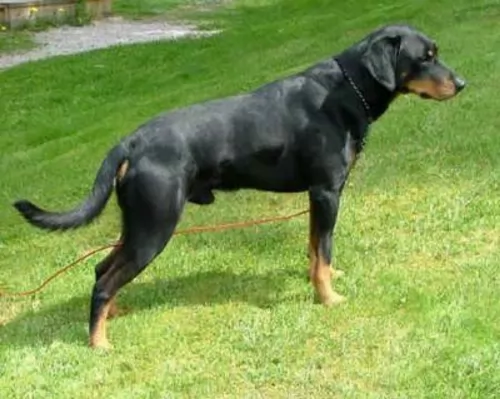 The Smålandsstövare has got quite a long history and dates back to the 1600s. He is the smallest of the Swedish hound breeds. This is a scenthound.
The Smålandsstövare has got quite a long history and dates back to the 1600s. He is the smallest of the Swedish hound breeds. This is a scenthound.
Hounds similar to the Smålandsstövare were bred with European hounds and then brought to Småland and bred with local spitz-type farm dogs to create the foundation stock for the Smålandsstövare.
The dog was used to hunt but nearly died out in the 20th century, but breeders restored it and the first official standard emerged by the Swedish Kennel Club in 1921.
The Smålandsstövare is a rare dog breed but it is recognized by the American Rare Breed Association as well as other major kennel clubs, one of which is the Federation Cynologique Internationale as well as the United Kennel Club.
The Gran Mastin de Borinquen is a large dog. He stands roughly between 56 and 71cm and weighs in at between 41 and 68kg.
He is well muscled with a large head and short floppy ears but until recently the ears have always been cropped. The nose is black, the eyes dark brown and small and he has an alert, intelligent look to him.
These days the tail is kept long and it is held low. The coat is short in length and harsh with the colour being fawn, black, cream or brindle. You'll also find some small inclusions of white on the coat.
Loyal and protective, the Gran Mastin de Borinquen forms a strong bond with his master, becoming aggressive with any stranger who comes too close to his owner.Its a dog that has been taught to be aggressive so he isn't the best pet to choose if you have children in the home. He isn't the best dog either for first time dog owners, particularly if the person isn't a strong, firm person around him, showing who is boss.
However there are people who have had their pet trained and socialized and who claim he makes a wonderful family pet. The way a dog is brought up can play a large role in the way he turns out.
Train and socialize your Gran Mastin de Borinquen because he is inclined to be strong-willed and for a large, aggressive type of dog, you want him to be obeying you.
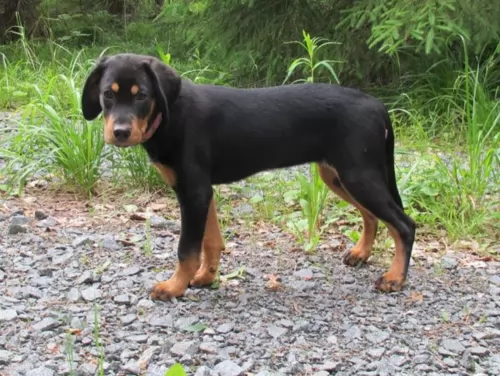 The Smålandsstövare is a muscled, compact looking dog. The double coat is shortish to medium length and is thick and quite coarse to the touch. He sheds seasonally. The coat is usually black with tan markings.
The Smålandsstövare is a muscled, compact looking dog. The double coat is shortish to medium length and is thick and quite coarse to the touch. He sheds seasonally. The coat is usually black with tan markings.
The high set ears are medium length and floppy, the head is slim and the tail can be naturally short. Sometimes the tail is long and can be slightly curved in the spitz-like sabre fashion.
The eyes are brown and friendly. The height of these dogs is about 46 to 54cm and he weighs anything from 15 to 18kg.
Usually a well behaved, quiet, calm, gentle dog, the Smålandsstövare takes his role as guard dog seriously, wanting to protect his family.
His good temperament ensures he gets on well with all members of the family. He is full of energy and will need to be exercised well, whether it be ball games in the garden, a walk around the block, a run in the park or joining his family on hikes and camping trips.
It is why he won’t settle down well on a small property in the city. He needs larger premises to expend his energy, and if in cramped premises without exercise, he may resort to barking and whining and this may well drive your neighbors bats.
Training and socializing your Smålandsstövare will be necessary and it should be easy as he is intelligent.
Noble, courageous and loyal, a trained, socialized Gran Mastin de Borinquen who has learned simple commands such as sit, down, come, stay, lie-down and heel will be an absolute pleasure to have around and be a well behaved, obedient companion for you.
Your Gran Masin is a dignified, loving animal, but because of his size and his origin, bred to be aggressive, he isn’t looked upon as the first choice when you’ve got small children in the home. With the right owner – fair, firm and loving - he makes a splendid pet.
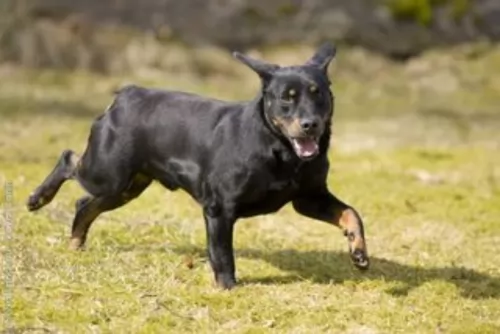 The Smålandsstövare is a robust dog with a lot of stamina. He will be wanting a lot of exercise and is ideal as a pet in the suburbs or the countryside but not ideal for city living.
The Smålandsstövare is a robust dog with a lot of stamina. He will be wanting a lot of exercise and is ideal as a pet in the suburbs or the countryside but not ideal for city living.
He makes a wonderful family pet, forming strong bonds with his owners. He makes an excellent watchdog too wanting to protect his family, and with this amicable, calm dog, you’re going to have a true friend.
Your Gran Mastin de Borinquen can get to 12 years of age with good care. Mastiff-type dogs like this can be prone to eye problems as well as having to tackle joint problems such as hip dysplasia.
Other issues that can appear in this breed, but are unlikely be cancer, bloat, hypothyroidism and von Willebrand’s Disease which is a bleeding disorder.
Remember to do daily inspections of your Gran Mastin de Borinquen for fleas and ticks, particularly during the Summer month. Toxins introduced into the body by a tick bite for instance can make your pet seriously ill so that veterinary intervention is required.
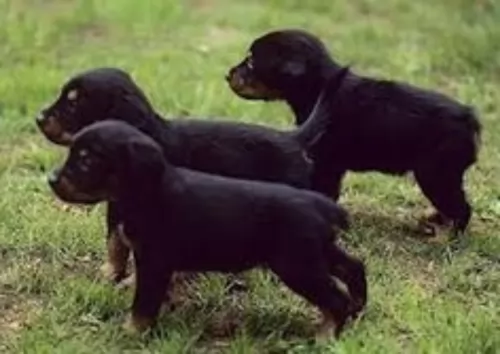 The Smålandsstövare is a rare dog breed and not much is known about congenital conditions to which he may be particularly prone.
The Smålandsstövare is a rare dog breed and not much is known about congenital conditions to which he may be particularly prone.
With good care he can reach 14 or 15 years of age. The floppy ears put him at risk for ear infections, while other conditions to watch for include hip dysplasia, cancer, bloat and obesity.
If you see your dog shaking his head or pawing at his ears, look inside because the ears may be red and inflamed. It is important to get help quickly for ear problems in dogs.
Ear canals are sensitive so if you don’t want to clean the ear and work on it yourself it is important to get your pet to the vet. The vet will clean your dog’s ears and also prescribe antibiotics.
For future treatment, you will need to clean your dog’s ears and keep them dry. If you don’t want to do this yourself, make sure to get him to professional groomers who will do this for you.
The Gran Mastin de Borinquen, with his short coat, is a relatively low maintenance breed. Brush him at least twice a week to keep the coat free of loose hairs. Other grooming requirements are keeping his ears clean and dry. You can ask about alcohol wipes at your local pet shop to use in his ears. Check the nails too and remember to brush his teeth a couple of times a week to avoid dental decay.
You won't find the Gran Mastin de Borinquen being a particularly high energy dog but he also isn't a couch potato. If you enjoy a walk every day for your own good health, include him in these walks and give him a game of ball every now and again.
This Mastiff -type dog is large, and they tend to be fairly lazy, not using up great deals of energy. Young dogs however use up more energy and will require a diet with good quality protein.
Dogs that have been spayed or neutered as well as senior dogs will require less calories. If you buy commercially manufactured food, check the labels carefully and buy high quality food for a large breed.
Don't just feed your Gran Mastin kibble everyday but alternate it sometimes, mixing in some raw meat into his kibble or mixing in some cooked chicken, rice and vegetables.
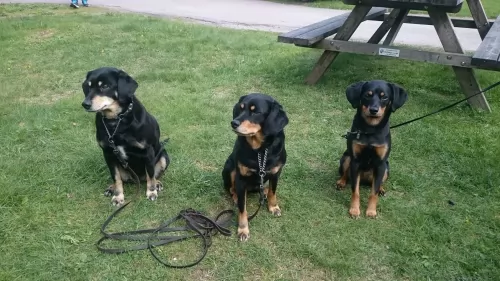 Choosing a good diet is imperative for the Smålandsstövare. Choose a commercially manufactured dog food high in vitamins and minerals.
Choosing a good diet is imperative for the Smålandsstövare. Choose a commercially manufactured dog food high in vitamins and minerals.
Give your dog a treat by providing him with some home-made food. It can be added into the dry kibble about twice a week as a treat. Boil brown rice and chicken in a pot and add in sweet potatoes, carrots and spinach. Chop all this up and give it to your dog in small portions. Also try to include some raw meat into the diet.
The Smålandsstövare is a very energetic breed and he is going to require some vigorous exercise every day. Take him for walks, allow him to run with you when you cycle or jog or take him swimming.